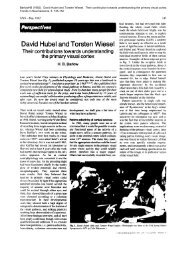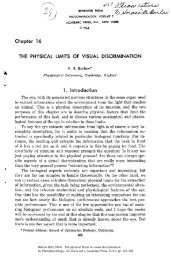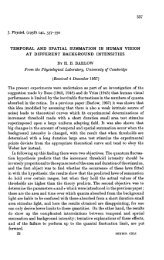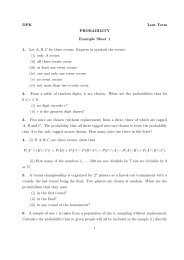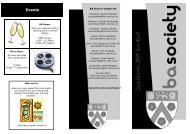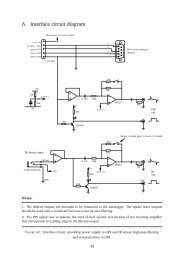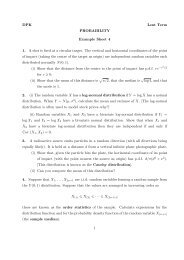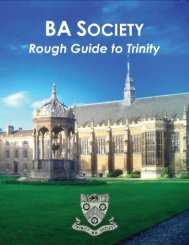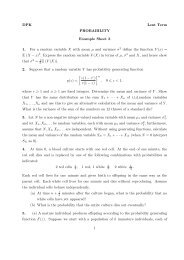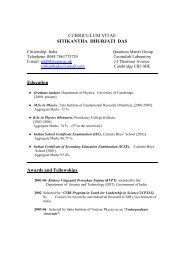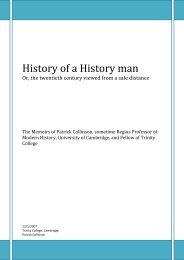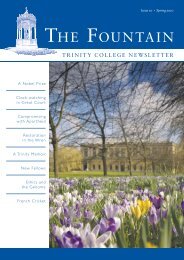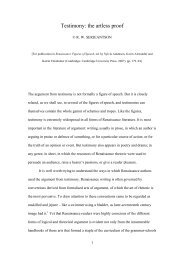Hume's General Rules - Serjeantson
Hume's General Rules - Serjeantson
Hume's General Rules - Serjeantson
You also want an ePaper? Increase the reach of your titles
YUMPU automatically turns print PDFs into web optimized ePapers that Google loves.
<strong>Serjeantson</strong>-12<br />
regulae. Whilst Hume goes on in the following sentences to discuss the example of<br />
natural philosophy, it is clear that he does not regard the formulation of such rules as<br />
being restricted to that discipline. 40 The second point to emerge from this passage is<br />
that, within the discipline of logic, Hume regarded rules as having the function of<br />
directing the ‘judgment’ (‘a long system of rules and precepts to direct our judgment,<br />
in philosophy’), a comment that recalls the sub-title of the Port-Royal Logique:<br />
‘Containing, besides common rules (règles communes), several new observations for<br />
developing the judgment’.<br />
Hume, then, in a rather conventional manner, regarded his rules as pertaining<br />
to the ‘judgment’. His account of judgment, however, was quite different from the<br />
‘scholastic headpieces’ whose works he knew through Professor Drummond’s logic<br />
lectures. The typical account school-philosophers gave of the intellect or<br />
understanding (intellectus; cognitio) divided its activities into three distinct roles: the<br />
so-called ‘acts of the mind’ (actus intellectus). 41 (Hume employs this scholastic term<br />
in the Treatise.) 42 The three ‘acts of the mind’ consisted of ‘apprehension’<br />
(apprehensio), judgment (judicium), and ratiocination (discursus). 43 The logics taught<br />
in the Scottish universities in the later seventeenth and earlier eighteenth centuries all<br />
endorsed this division. 44 Indeed, seventeenth- and earlier eighteenth-century works on<br />
logic were commonly organised according to this arrangement, with each act of the<br />
40 Cf. Noxon, Hume’s Philosophical Development, p. 82-83 (a valuable discussion), who characterizes<br />
this section as ‘some remarks in the Newtonian spirit upon the difficulty and importance of devising<br />
experiments to exclude extraneous factors’, goes on to note the different concerns of Newton’s and<br />
Hume’s rules--the one with the physical world, the other with human experience--but concludes that<br />
they are nonetheless ‘quite compatible’.<br />
41 Drummond taught this doctrine in his lectures: Echelbarger, ‘Hume and the logicians’, pp. 140, 144.<br />
42 Hume, Treatise, p. 150 (1.3.13): ‘this act of the mind’.<br />
43 The details of terminology varied, but the structure remained constant. This account is taken from<br />
one of the most widely read school-philosophers in the period, Franco Burgersdijk. The actus<br />
intellectus are found widely in early modern Aristotelian philosophy, although they are nowhere<br />
distinguished in Aristotle’s Organon or De anima; see further E. J. Ashworth, ‘Editor’s introduction’,<br />
in Robert Sanderson, Logicae Artis Compendivm (1618), ed. E. J. Ashworth (Bologna: Clueb, 1985),<br />
pp. ix-lv, pp. xl-xli.<br />
44 Emily Michael, 'Frances Hutcheson's Logicae compendium and the Glasgow school of logic', in<br />
Logic and the Workings of the Mind, pp. 83-96, p. 88.



